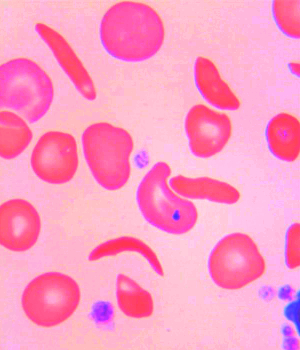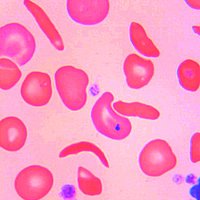From anemia to blood clotting disorders
Non-malignant blood diseases include diseases associated with anemia, white blood cell deficiency, or blood clotting disorders (platelet deficiency, other blood clotting disorders). These diseases are often inherited and persist chronically, sometimes for life. The signs of the disease often go beyond the absence of the particular function of the affected blood cells. For example, sickle cell disease, one of the common inherited forms of anemia, is also a multisystem disease affecting all organ systems and is notable for recurrent pain. Other blood diseases that we treat in our outpatient clinic are thalassemias, hemolytic anemias due to membrane defects (including spherocytic cell anemia) and enzyme defects (including favism, pyruvate kinase deficiency), congenital platelet disorders, blood coagulation disorders, disorders of hematopoiesis (Diamond-Blackfan anemia, congenital neutropenia, Fanconi anemia, among others) and autoimmune cytopenias (idiopathic thrombocytopenia, autoimmune neutropenia, autoimmune hemolysis).
Wherever reasonably possible, we offer patients with these diseases participation in patient registries or even clinical trials. In doing so, we pursue the following goals:
- In the case of unexplained anemias, we offer comprehensive genetic diagnostics within the framework of the Rare Anemia Registry in order to be able to establish rare diagnoses with certainty
- In various registries, we collect data on the course, treatment and complications of these rare diseases. The aim is to improve care in the future and to provide patients and physicians with individualized advice based on this data.
- In addition, data collection in registries serves to identify factors that predict the course of the disease.
- Clinical trials test new therapies under strictly controlled conditions. These range from the use of new drugs to cures using modern cell therapies such as stem cell transplantation or gene therapy.
To pursue these goals, we coordinate national registries ourselves, participate in GPOH trials and registries, and also participate in trials testing new therapeutics.
The primary goal of the registry is to record the nature, complications, and treatment of sickle cell disease. In addition, data will be made available for scientific analysis. Based on the results, the treatment guideline will be adapted and the care of sickle cell patients will thus be improved. The registry is headed by KiTZ senior physician Dr. Joachim Kunz
Contact:
Dr. med. Joachim Kunz
Im Neuenheimer Feld 430
69120 Heidelberg
Telefon +49 (6221) 563 9836
joachim.kunz(at)med.uni-heidelberg.de
More information on the sickle cell registry can be found here: GPOH hematology study portal.
In addition to the common acquired causes of anemia, such as alimentary iron deficiency, there are over 90 known rare anemias. In addition, there are rare anemias whose causes are unknown. Thalassemias, which are common worldwide, are among the rare anemias in Germany and other central European countries, but due to migratory movements they are being diagnosed in an increasing number of patients here as well. Due to the so far rare occurrence of these diseases, optimal diagnostic and therapeutic options for patients affected by rare anemias in Germany are often limited.
The present registry pursues several goals:
- Recording the epidemiology of rare anemias
- Recording of the clinical and hematological phenotype of the affected patients
- Documentation of treatment and complications encountered
- Improving the care of affected patients by advising physicians who treat patients with rare anemias and by adapting treatment guidelines based on the results of the registry evaluation
- Identifying the causes of rare and unexplained anemias by means of specialized and individualized stepwise diagnostics
- Establishment of a biobank with samples from patients with rare anemias
- Provision of data for scientific evaluation and as an aid in health policy decisions
Patients suffering from anemia for which a specific GPOH registry is established are not additionally included in the rare anemia registry. These include sickle cell disease (www.sichelzellkrankheit.info), severe aplastic anemia, Diamond-Blackfan anemia, and Fanconi anemia.
The registry presented here is thus in line with the intention of the German government and the European Union to improve the life situation of patients with a rare disease - in this case a rare anemia.
The registry is headed by the KiTZ medical director, Prof. Andreas Kulozik, MD, PhD and Head of Molecular Medicine, Prof. Martina Muckenthaler.
Contact:
Rare Anaemia Registry
Im Neuenheimer Feld 430
69120 Heidelberg
Phone +49 (6221) 56 37918
SelteneAnaemien.KIND(at)med.uni-heidelberg.de
For more information on the Rare Anaemias Registry, please visit the GPOH Hematology Study Portal.


